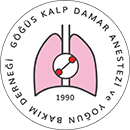

Extracorporeal Cardiopulmonary Resuscitation in Pediatric Cardiac Patients: A Single-center Experience
Murat Çiçek1, Emine Hekim Yılmaz21Department of Pediatric Cardiovascular Surgery, University of Health Sciences, Dr. Siyami Ersek Thoracic and Cardiovascular Surgery Training and Research Hospital, İstanbul, Türkiye2Department of Pediatric Cardiology, University of Health Sciences, Dr. Siyami Ersek Thoracic and Cardiovascular Surgery Training and Research Hospital, İstanbul, Türkiye
Objectives: Extracorporeal cardiopulmonary resuscitation (ECPR) has been shown to increase survival rates after in-hospital pediatric cardiac arrest. The aim of this study was to describe our experience with ECPR in pediatric cardiac patients.
Methods: We performed a retrospective analysis of our experience from a single institution with 54 patients who underwent ECPR between 20162024. The endpoint of the study was survival to discharge.
Results: Twenty-seven patients (50%) were female, and the median age at the time of ECPR was 5 months (IQR, 0.723 months). Seventeen (31.5%) of the patients were neonates, and 44 patients (81.5%) had biventricular physiology. Forty-eight patients (88.8%) underwent open chest cannulation, and 6 patients (11.2%) underwent peripheral cannulation. There were 24 survivors (44.4%) and 30 (55.6%) non-survivors after ECPR. Forty-four of the patients were postoperative (81.5%), and 23 of them survived. The survival rate in postoperative patients (52.3%) was significantly higher than in non-postoperative patients (10%) (p=0.015). Forty-five patients (83.3%) had cardiac arrest in the intensive care unit (ICU), and the survival rate was significantly higher in ICU cardiac arrest patients (51.1% vs. 11.1%, p=0.029). The survival rate without neurological sequelae was 31.4%. The median duration of ECMO support was 5 days (IQR, 28 days).
Conclusion: Extracorporeal cardiopulmonary resuscitation is a vital application in pediatric cardiac patients. Patients who had cardiac arrest in the ICU had better outcomes than non-ICU patients (p=0.029). Survival rates of postoperative patients were found to be better than those of non-postoperative patients (p=0.015).
Keywords: Congenital heart disease, extracorporeal membrane oxygenation, pediatric extracorporeal cardiopulmonary resuscitation
Manuscript Language: English
(616 downloaded)

















